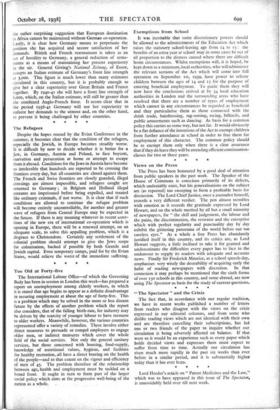Too Old at Forty-five The International Labour Office—of which the
Governing Body has been in session in London this week—has prepared a report on unemployment among elderly workers; in which it is stated that age begins to appear as a definite disadvantage in securing employment at about the age of forty-five. This is a probleni which may be solved in the more or less distant future by the effects of another problem which the report also considers, that of the falling birth-rate, for industry may be driven by the scarcity of younger labour to have recourse to older workers. Meanwhile, however, the various countries represented offer a variety of remedies. These involve either direct measures to persuade or compel employers to engage older men, or indirect measures which cover the whole field of the social services. Not only the general sanitary services, but those concerned with housing, food-supply, knowledge of nutritional values, hygiene, and facilities for healthy recreation,all have a direct bearing on the health of the people—and to that extent on the vigour and efficiency of men of 45. The problem therefore of the relationship between age, health and employment must be tackled on a broad front. It ought in turn to form part of the larger social policy which aims at the progressive well-being of the nation as a whole.
























































 Previous page
Previous page